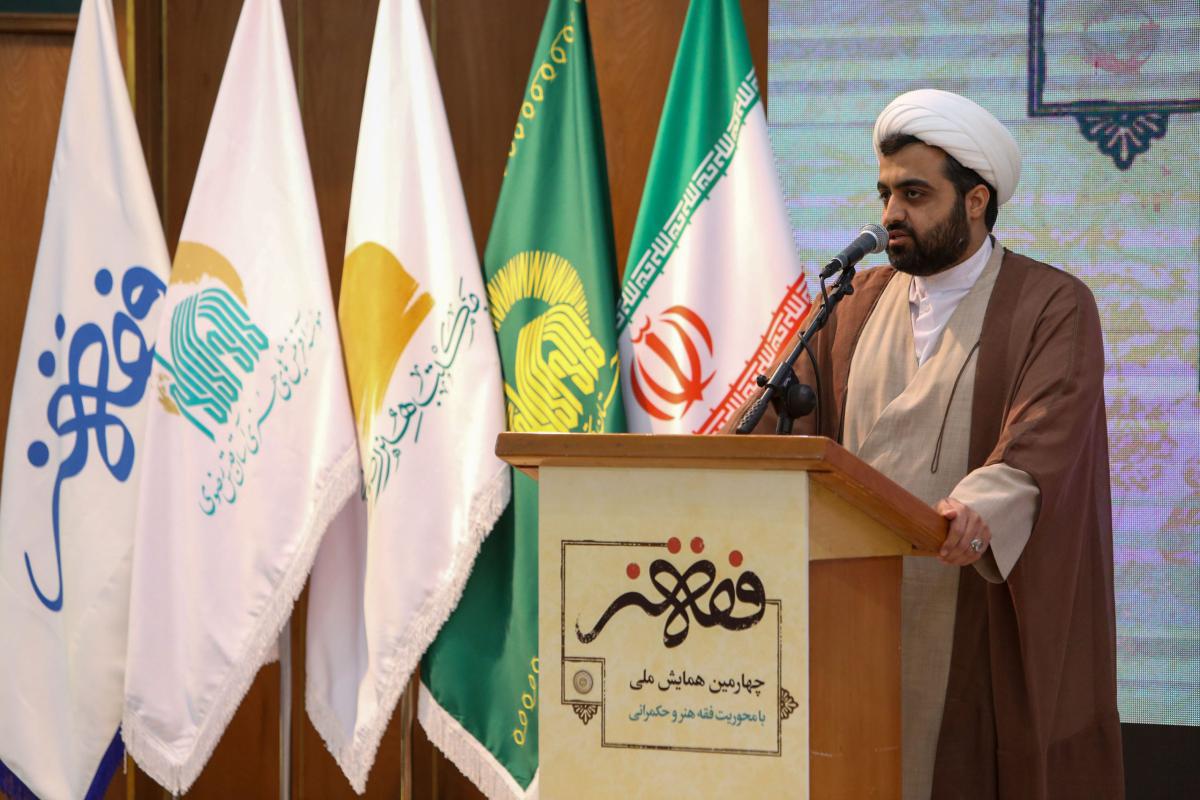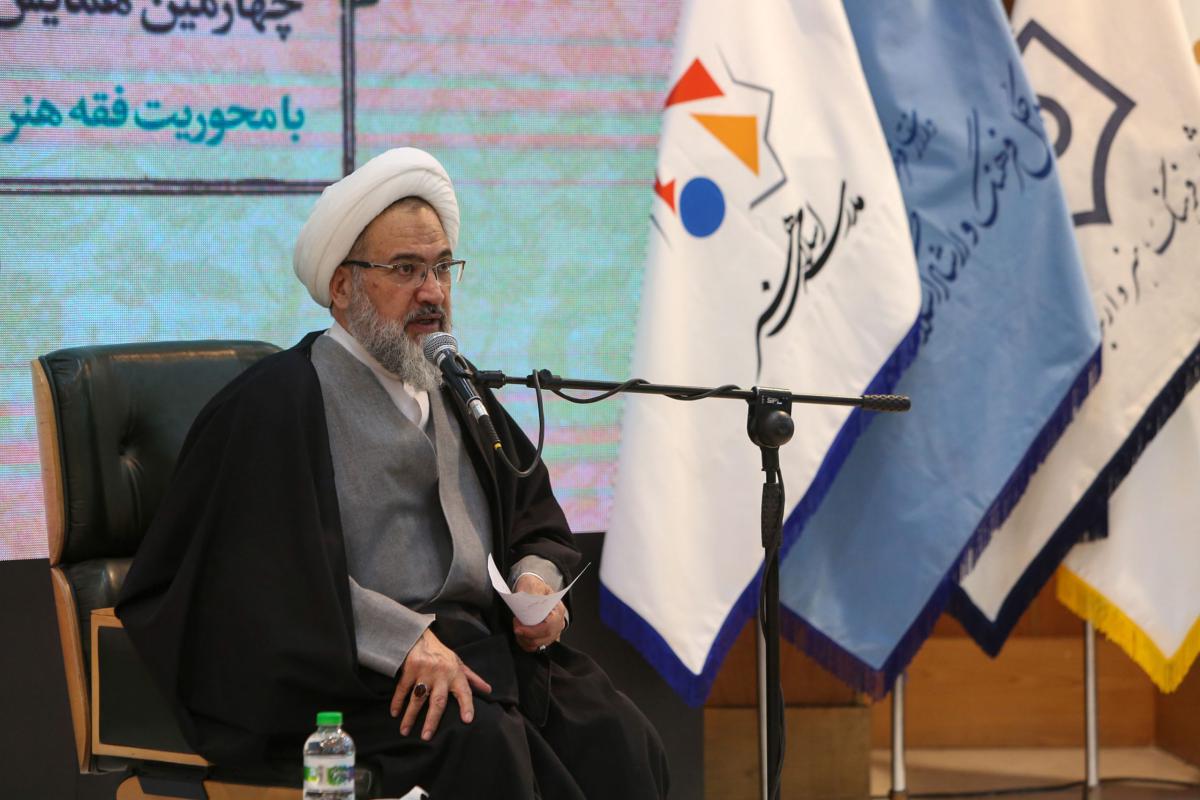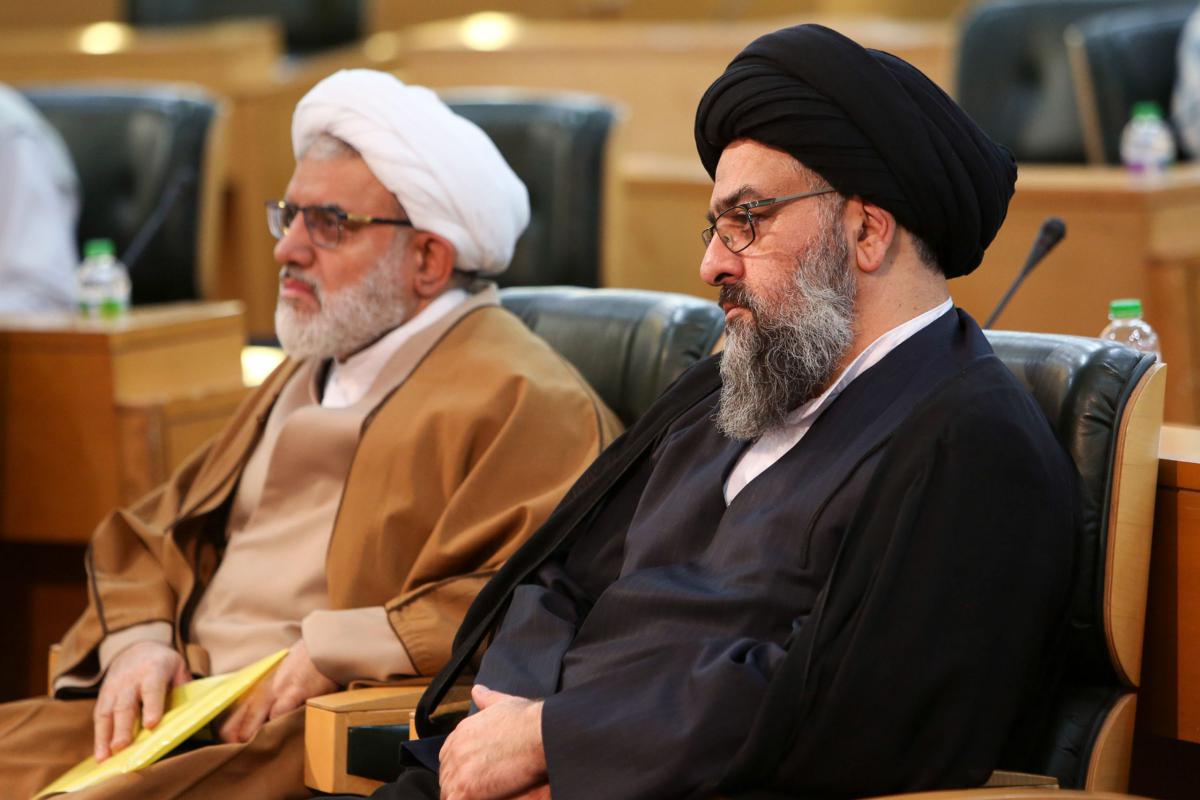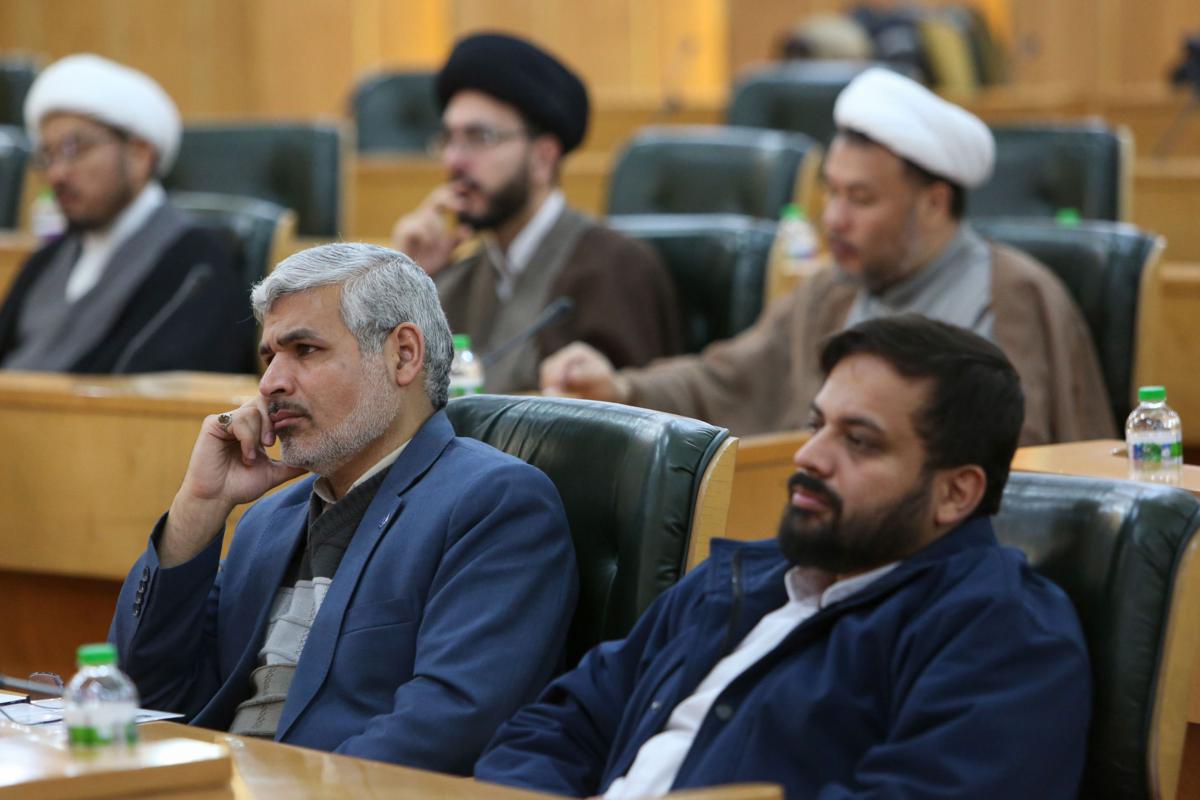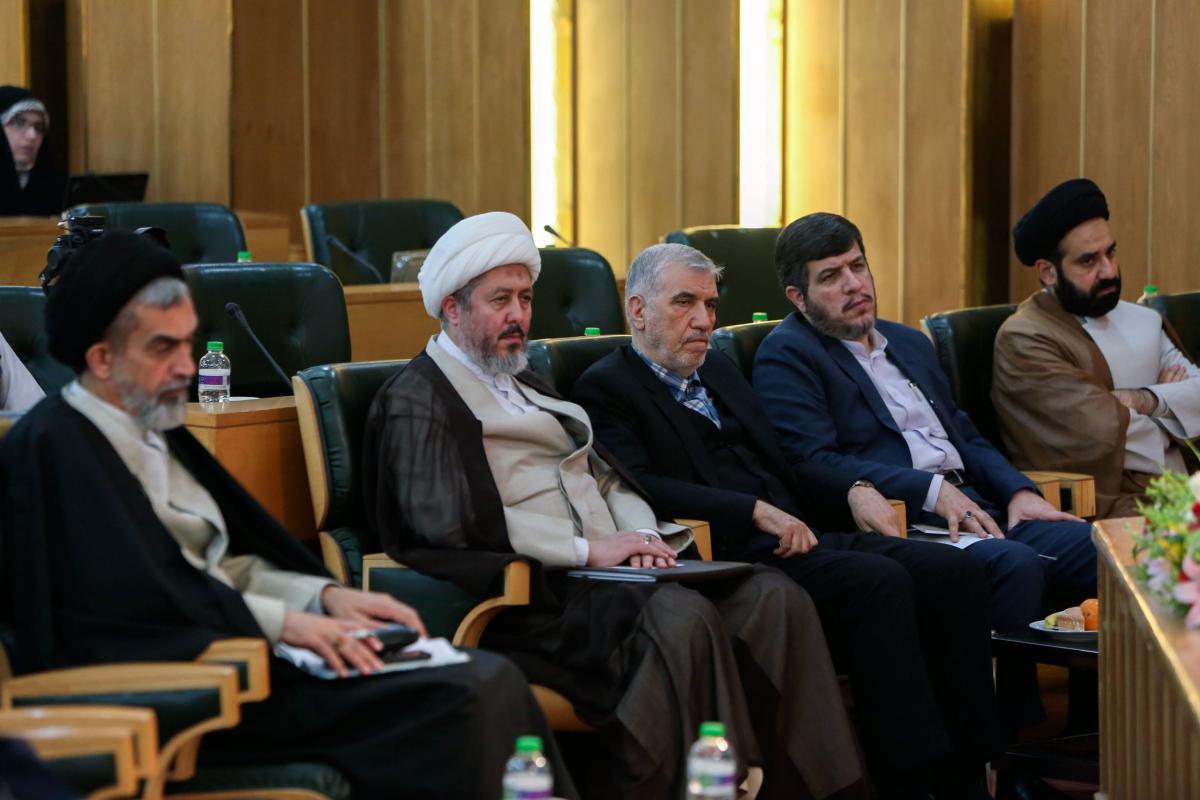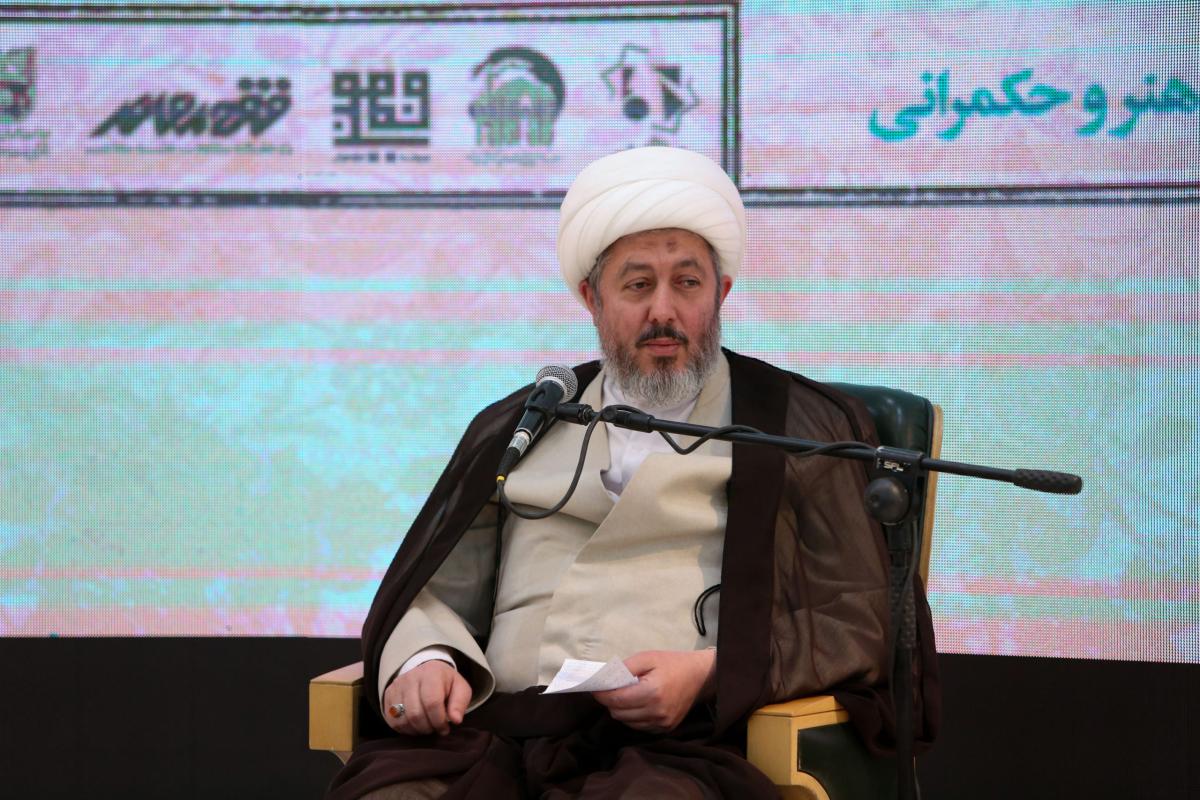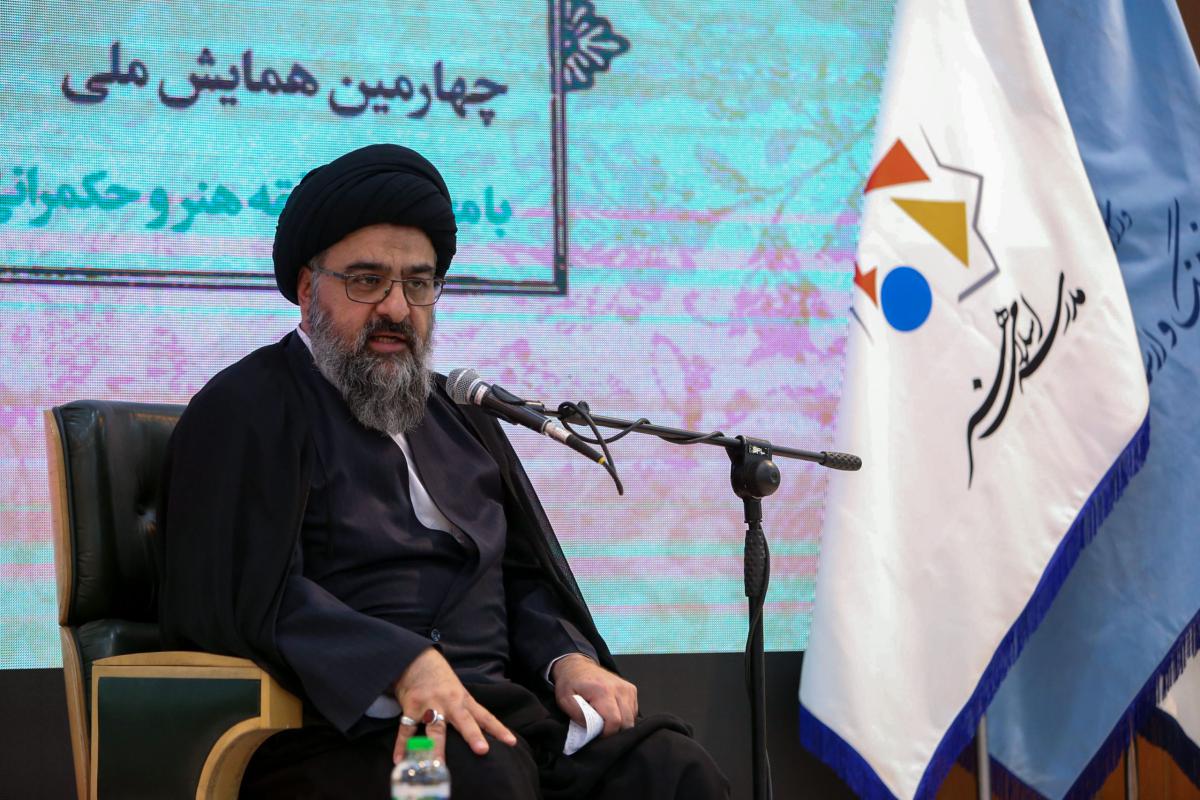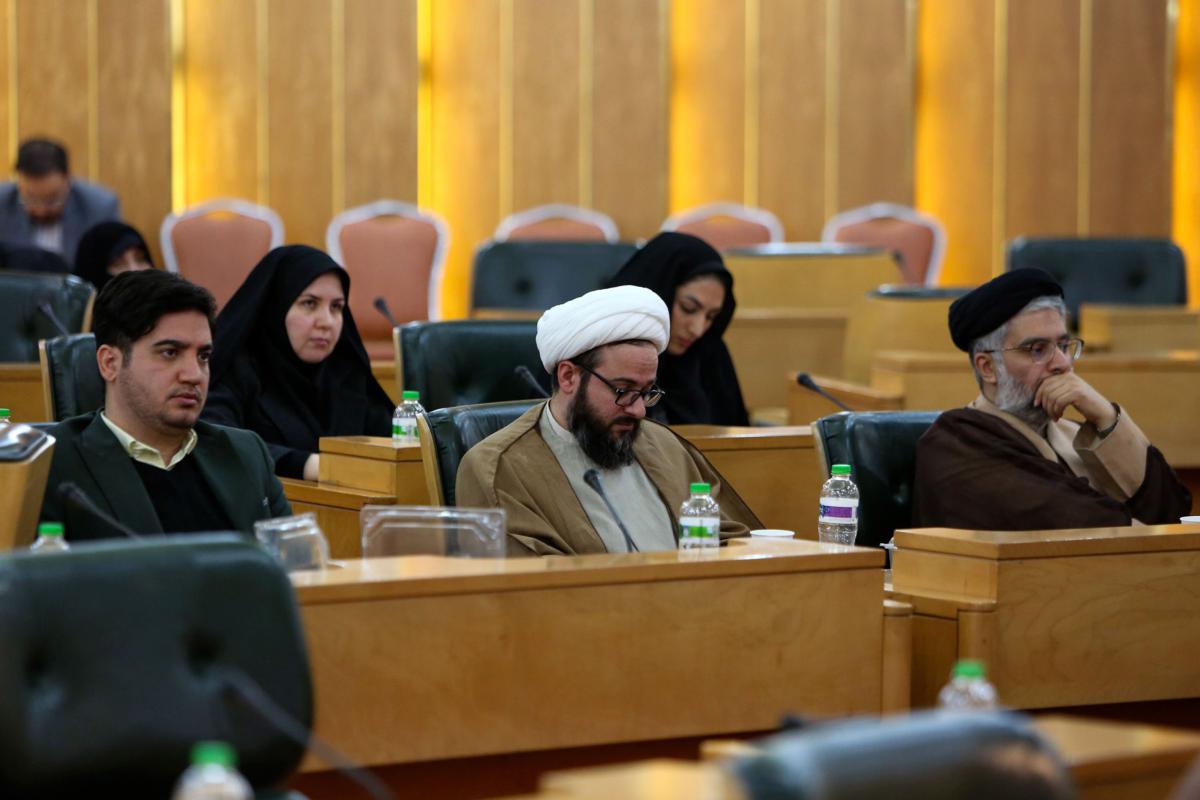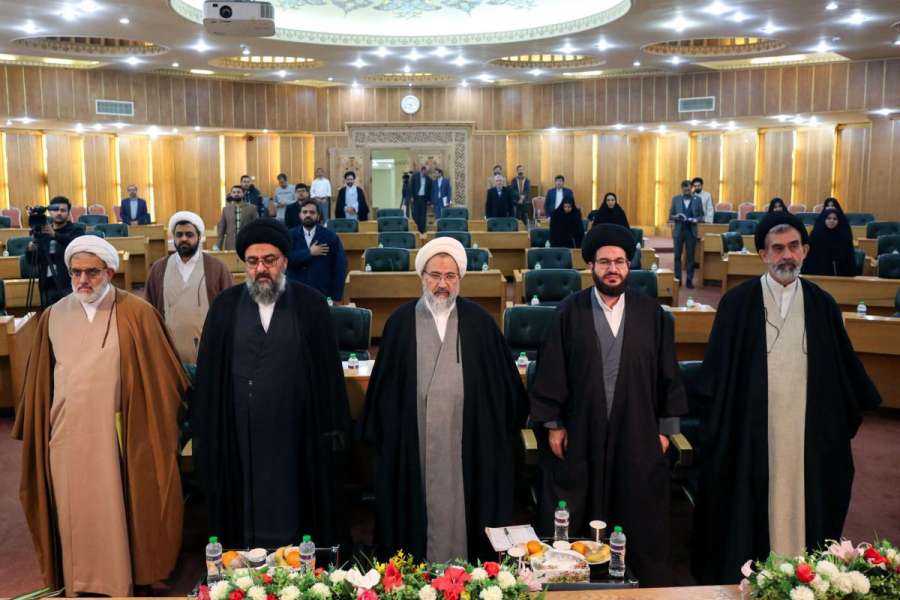The 4th National Art Jurisprudence Conference titled “Art Jurisprudence and Governance” was held with the participation of the Contemporary Jurisprudence Research Institute in the last days of Bahman, lranian calender near the pure Razavi Shrine.
This two-day conference was held in the place of Shaykh Tabarsi Hall of Astan Quds Razavi Scientific and Cultural Organization with the presence of a group of scholars, professors, academics, intellectuals and jurists.
In the opening ceremony, while summarizing the speeches of the supreme leader of the revolution about the art jurisprudence conference, Professor Abul Qasem Alidust, Professor Hamid Derayeti, Ayatullah Sayyid Mujtaba Nurmufidi and other invited professors gave speeches, and Ayatullah Alam al-Huda and Muhammad Mahdi Esma’ili, Minister of Culture and Islamic Guidance, were the final speakers of this conference.
This course of the conference focuses on the six axes of “jurisprudence of art; policy making and legislation”, “Jurisprudence of art, supporting Islamic art and dealing with deviations”, “Jurisprudence of art; monitoring the implementation of laws and policies”, “Jurisprudence of art and rulers”, “Governance in art and jurisprudential fatwas” and “National media and governance in the field of art” and by presenting research articles by professors in specialized commissions.
The long path of deepening and developing art jurisprudence
In this ceremony, Hujjatul Islam Mustafa Durri, the director of the art jurisprudence school, pointed out that eight years ago the first edition of the art jurisprudence conference was held in the country and stated: Undoubtedly, the fourth edition of this conference is significantly different from the first edition, as today in the fourth term, we see the wide participation of jurisprudence and art students, as well as the people of politics, culture and art.
Emphasizing the cooperation and synergy of various institutions in holding this conference, he said: holding this conference has deepened and developed art jurisprudence, but we still have a long way to go.
This scholar of art jurisprudence, mentioning the topics of the previous three editions of the art jurisprudence conference, said: So far, the result of holding this conference has been four volumes of books focusing on the collection of articles, which have attracted the attention of scientific, research and governance centers. I hope that the book of the collection of articles of the fourth session of the conference will be unveiled tomorrow morning with the presence of the Minister of Culture and Islamic Guidance.
Durri, pointing to the holding of scientific meetings in the School of Jurisprudence and Art with the presence of jurisprudence and art idividuals, continued: With the synergy and cooperation of jurisprudence and art individuals, we have been able to implement joint projects.
The necessity of discipline, dynamism and efficiency in art jurisprudence
Ayatullah Abulqasem Alidust, the scientific secretary of the 4th National Conference on Jurisprudence of Art, said: It has been said many times in such meetings that Islam started with art and continued with art.
This professor of jurisprudence and principles of Qum seminary, referring to some of the events of Ashura, Karbala’ such as the delivery of a sermon by Imam al-Sajjad (‘a) at the Bani Umayyad palace, added: if such religious events or, for instance, al-Sahifeh al-Sajjadiyyah with an artistic view by an artist, if it is examined with good taste, the saying that Islam begins and extends with art will undoubtedly have a special effect. The great event of Ashura can be described in artistic, epic and revolutionary terms. The movement that Imam Husayn (‘a) had with Hadrat Hur legions is an artistic phenomenon, the first encounter and behavior of Hadrat Zaynab (‘a) in the presence of Ubaydullah, where she says”l will vote only beautifully” means I saw nothing but beauty, also from an artistic point of view can be checked.
He went on to say: Today, in addition to being a scientific phenomenon, the art jurisprudence conference has also become a social phenomenon, which shows that artists can understand the concerns of jurists, and vice versa, jurists can also understand the concerns of artists.
Ayatullah Alidust clarified: The fourth session of this conference is important in two ways; First of all, it is being held next to Imam al-Rida (‘a). Its other importance is due to its subject centered on art and governance jurisprudence. Of course, the topics of previous courses were also important.
This professor of Qum seminary emphasized that in art jurisprudence, our best effort is to have discipline, dynamism, and efficiency, and he said: Also, if meetings are held focusing on art jurisprudence, there is a need for the presence of experts.
Ayatullah Alidust reminded: It was possible to write an article for this great cultural event by all those interested in art, based on which 40 articles were sent to the secretariat of the conference in accordance with the correct structures of essay writing.
The need for jurists to pay attention to art as an inevitable necessity
At the opening ceremony, professor Hamid Derayati said in a speech, referring to the importance of art in all fields: the discussion of art is a necessity that jurists must accept and there is no point in denying it. Its necessity is also a kind of natural demands.
He continued: Although art is natural, some parts of it are also instinctive. Also, art is the best language to convey a message. On the other hand, the language of art is soft, expressive and transnational, which crosses all borders and can be understood by everyone with different cultures.
The Professor of Jurisprudence and Principles of Mashhad Seminary said: Art is also a part of our national identity and cultural identity, therefore jurists should take a serious look at art. In the meantime, art is one of the important factors in creating social solidarity, and this issue has been emphasized a lot today.
Derayati described beautiful, eloquent and expressive speech as an art and added: lmam Ali (‘a) said that beautiful, balanced and proportionate speech works wonders, it is one of the art of eloquent speech.
Also, the professor of Khurasan Province seminary stated: Ignoring art is neglecting a part of a nation, for this reason, the category of art should be taken seriously from the point of view of jurists, and this issue should be looked at comprehensively, because art is one of the important factors of solidarity.
He further added: Today, art is a tool for attack, which the enemies use well. Therefore, if we have a security point of view, we must look at this role of art in defense of national and cultural identity. In fact, art should be used properly in governance.
The professor of Khurasan seminary said: “Also, art is an industry today, and attention to the career concerns of artists is the duty of the government and it should be organized.”
The head of Andishvaran Institute continued: In order to make decisions in the field of art, one must address issues that have been raised in the past as well as what exists today.
Derayati said: the value, nature and jurisprudential identity of art is sometimes determined by its function, and this is an important issue. For instance, a work of art may not have the red line according to jurists, but its function is, for example, spreading hatred.
Referring to the intrinsic value of art, this professor of jurisprudence and principles of Mashhad Seminary added: Art generally lacks meaning, so one of the points that jurists should pay attention to is giving meaning to art, and this should not be ignored, so the interaction of jurisprudence and art is essential nowadays.
A gap between jurisprudence and art
Ayatullah Sayyid Mujtaba Nurmufidi, speaking about the importance of responding to the problems of today’s society by using the capacity of jurisprudence, presented a solution in this field and said: At several levels, things should be done. The first level is ijtihad and inference operations, which need to be read and revised. In new problems, it is necessary that it can be done by observing the two elements of time and place.
The head of the Research Institute of Contemporary Jurisprudence stated: If we do not use jurisprudence in various fields, we will accuse jurisprudence of inefficiency. At present, jurisprudence has not provided answers to many issues related to art. In other words, the distance between jurisprudence and art is very large and a deep gap has been created between them. This gap has also been created due to various factors, which I consider to be due to our lack of work.
The head of the Research Institute of Contemporary Jurisprudence continued: In the era when the jurists and were up-to-date and ahead of their time, the West is lagging behind and this is the source of many problems. After the passing of the modern era, in the post-modern era more than 20 artistic movements were formed. These movements are the product of schools of thought, tendencies and representative of different thoughts.
Ayatullah Nurmufidi added: Art has an inherent function, with the characteristic of tenderness, it is close to the human spirit, this function has the transmission and permanence of the message. Therefore, it needs to be identified and recognized.
The professor of the seminary emphasized: Today, facing the issues of the day, jurisprudence needs to be organized, especially in the areas of the influence of time and place in ijtihad, we must pay attention to this issue. In all categories, especially the issue of art, we are facing new issues that jurisprudence paying attention to the conditions of the time should address this issue.
In conclusion, the head of the Research Institute of Contemporary Jurisprudence, referring to the points of contact between jurisprudence and art that exist in different fields, said: Governance is the most important point of contact between jurisprudence and art.
The governance of religion and the role of “jurisprudence” in society
Ayatullah Sayyid Ahmad Alam al-Huda at the conclusion of the 4th National Conference on Jurisprudence and Art, stated: If jurisprudence had penetrated into different areas of our social life, maybe the rule of religion would have been implemented in our society and no political or social obstacle could stop the rule of religion.
He continued: The main reason for this issue, which has not been implemented in the society and in different dimensions of people’s lives, is due to the lack of influence of jurisprudence in these fields. The seminary jurisprudential issues are mainly created due to the points of ambiguity that exist in our theology.
The representative of the jurist in Khurasan Razavi, stated: Despite the fact that there have been extensive researches regarding jurisprudence throughout history, in the field of inference and reasoning in the extraction of rulings, many activities have been carried out, but we have encountered problems in jurisprudence.
Alam Al-Huda stated: If complete research had been provided by researchers and talented and strong forces who work tirelessly in this field, we would not have had problems in the issue of jurisprudence in many areas of our social life, which causes the rule of religion.
Regarding jurisprudence, the senior professor of Mashhad Seminary said: This issue is an important principle for us in the field of inference and extraction and the flow of jurisprudence, in fact, the main issue of the ruling, which is the proof of the ruling, is not this type of issue, but the specific example that the field of obligatory verb comes and it must be obligatory.
The representative of the religious jurist in Khurasan Razavi continued: We have the issues that we have in the Shari’ah proofs, which in many cases are actually a series of examples that were expressed during the time of the holy Shari’ah. While if we refer to the evidences that are stated in the form of reasons, we see that there is a higher and wider general issue.
A member of the Supreme Council of Khurasan Seminary stated: Today, in the position of deriving rulings and many issues affecting us in various fields, we can reach a definitive and Shari’ah opinion and include jurisprudence in various fields of our social life.
Referring to the connection between later jurisprudence and predecessor jurisprudence, Alam Al-Huda emphasized: The issue of the connection between later jurisprudence and the jurisprudence of the predecessors is actually established with a thematic research and we can use the foundations of our predecessors and our righteous predecessors in many issues in our day-to-day life issues.
The representative of the religious jurist in Khurasanv Razavi added: We have many traditions that have condemned music, including music performance, music making processes, and even the use of musical instruments, etc. This trend can be seen in the books of Istafta’at, as well as in the works of the late Imam’s fatwas and in the book of singing taught by the Supreme Leader.
Alam Al-Huda continued: But these hadiths were issued at a time when music was not an example of benefit at that time, and music was vulgar, like the currents that were promoted in the palaces of Bani Umayyad and Bani Abbas.
He stated: If we examine the same evidence, we will come across a series of traditions that we can consider the issue of sanctity as more general than music. A magnanimous jurist like Ayatullah Gulpaygani considered music to be haram in any way, while the Imam’s fatwa was completely different.
Regarding the concept of music in the past, Razavi, the representative of Wali al-Faqih in Khurasan, stated: The word for music in the olden days was the word abrogation. In the book al-Mufradat “Vocabulary”, Ragheb Esfahani defines the word “cancel” as meaning. “Cancellation” is an action that is issued from the subject and does not have a correct destination in its intention. Therefore, “Tarab” does not mean cancellation. So, if a program had a tarab and had a correct destination in front of it, that example would not be canceled.
In the end, Alam Al-Huda stated: “Art” in all its dimensions today is a field that is opposed to Islam with this obscenity, and in most of the artistic subjects we enter into, we encounter a kind of conflict with the current of religious governance in our own society.
Taking advantage of jurisprudential discipline in responding to cultural and artistic issues
Also, Muhammad Mahdi lsma’ili, at the unveiling ceremony of the book of abstracts of the 4th National Conference on Jurisprudence of Art, praised the participants and said: My presence in this conference, on the one hand, shows my support for the path that has started in this conference, and on the other hand, the declaration of the need in this conference is the domain.
He continued: This ministry is the regulator in various fields of culture and art governance of the country. In the meantime, it deals with the expansion of new technologies in the field of culture and art, especially since cultural and artistic products are being promoted and developed in all emerging fields.
Referring to the cultural and artistic consumption of today’s society, especially the young generation’s acceptance of new technologies such as computer games, lsma’ili added: Of course, old structures in this field, such as cinema, are still popular.
Referring to the development of cultural and artistic services in the country, such as the construction of new cinemas and cultural centers, he said: the field of culture and art has a general dominance and this is a very important point.
The Minister of Culture and Islamic Guidance stated: Our governance system is based on religious sovereignty, and jurisprudence is the main foundation of Islamic civilization. Therefore, jurisprudential regulation should be established according to the existing cultural and artistic situation. Undoubtedly, this is not easy.
Referring to one of the articles of the 4th Fiqh Art Conference related to the issue of dangerous regulation, he said: Every day, this ministry is involved with many issues in different fields, for instance, if a film stayed in the screening license council for a few days, what would happen.
Isma’ili added: Today, in the position of governance, we have to determine tasks for many of these issues according to the acceptance of the society and the requirements of the religious community. In fact, we are obliged to continue our movement according to the law and shari’ah.
He continued: The policy of the Islamic Republic is not to deny modern human achievements. We are against the manifestations of the arrival of modernity, which are sometimes polytheistic and sinful. In other words, our red line is the Holy Law.
Isma’ili pointed out: Every year, the public atmosphere of the country is getting closer to the value system, as we are preparing the documents of different artistic fields, and jurisprudential discussions have been seen in these fields. For instance, the music document has already been approved.
It should be noted that the final part of this ceremony was accompanied by the unveiling of the book of abstracts of the 4th National Conference on Art Jurisprudence with the presence of the Minister of Culture and Islamic Guidance and a group of senior cultural and artistic directors of the country.
It is worth mentioning that the 4th National Conference on Art Jurisprudence, under the auspices of the School of Art Jurisprudence and in collaboration with the Astan Quds Razavi Institute of Artistic Creations, as well as the Vice President of Virtual Space, Art and Media, the Office of Islamic Propaganda, the Research Institute of Culture, Art and Communication and the Research Institute of Contemporary Jurisprudence. It was held for two days until the evening of Thursday 26th of Feb.2024 near al-lmam al-Rida shrine.
